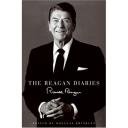 For Father’s Day, my wife gave me a copy of The Reagan Diaries.
For Father’s Day, my wife gave me a copy of The Reagan Diaries.
In the introduction, editor David Brinkley mentions that Reagan is one of only five presidents who kept consistent personal diaries. The other four were Washington, John Quincy Adams, Polk, & Hayes. That observation alone is remarkable, although understandable. Keeping a diary is a discipline – and presidents have way too many distractions. Keeping a diary is also a way of refining one’s own thoughts. Putting your ideas into words forces you to clarify and articulate what you mean. Keeping a diary also requires one to develop a certain facility with words – which Reagan had, but rarely gets credit for.
But I’ve digressed. I’ve only started the book, but I was immediately struck by an entry from April of 1981. By that point, Reagan had been in office for just over 90 days. He’d also been shot and spent several weeks recuperating from emergency surgery. There is a remarkable diary entry on April 23.
On April 23, Reagan sent a private note to the Soviet President, Leonid Brezhnev – and recorded the text in his diary. In the note, after agreeing with an observation Brezhnev made to him in an earlier note that substantive issues were best discussed face to face, Reagan raises only one issue. It is the height of the cold war. And he devotes 3/4 of his hand-written note to a plea to Brezhnev to release “the man Scharansky an inmate in one of your prisons.”
Reagan tells Brezhnev that, “I can assure you he was never involved in any way with any agency of the U.S. govt.”
The most remarkable part of the letter is Reagan’s offer to forgo any political benefit from securing Sharansky’s release: “. . . this is between the two of us and I will not reveal that I made any such request.”
Two years later, in July of 1983, there is a follow-up entry: “The Soviets are being devious about their promise to let Scharansky go. We’re going to hold them to it.”
Three years later, February 3 1986: “We have a deal to get him out of Russia. Last nite & this morning it was all over the news. I feared the publicity might queer the deal. Turns out the leak was from Moscow.
Finally, eight days later, on February 11, 1986: “1st news of the day ‘Scharansky freed by the Soviets.’ After years of imprisonment he was made part of a spy swap & allowed to rejoin his wife. We flew him to our base at Frankfort & an Israeli plane few to Tel Aviv. Later in day I received a call from P.M. Peres & Scharansky thanking us. I told them Kohl of W. Germany played a big part in putting this together.”
Even in his diary, Reagan refrains from claiming credit for what was accomplished. He does not write “Sharansky thanked me.” He writes “Sharansky thanked us.” And then he further shares the credit with the German Chancellor.
The point of all this: Sharansky is an important (but overlooked) figure in the course of the Cold War. He became a symbol of the Soviet Union’s intolerance of dissent and its denial of human rights. But he was also a person. His personal story inspires as an example of a courageous individual who doggedly refuses to compromise in spite of overwhelming odds.
Another point: Ronald Reagan was hardly an unsophisticated neophyte when it came to dealing with the Soviet Union. The story reveals his skills, but also the personal interest that Reagan took in Sharansky the individual. Reagan’s compassion for Sharansky is a revealing note on his character.
Final part of the story: A month after Sharansky’s release, he visited President Reagan in the White House. Here’s Reagan’s diary entry for that day, May 13, 1986 – about three months after Sharansky’s release:
Met with Anatoly Scharansky. It was fascinating to hear the story of his imprisonment by the Soviets. I learned that I’m a hero in the Soviet Gulag. The prisoners read the attacks on me in Tass & Pravda & learn what I’m saying about the Soviets and they like me.
-Rob Shearer
Director, Schaeffer Study Center